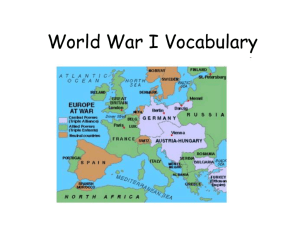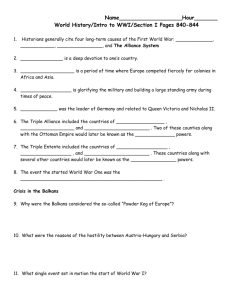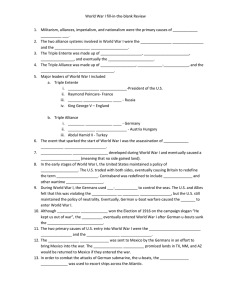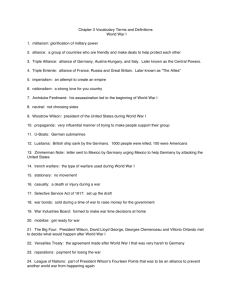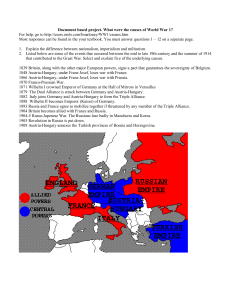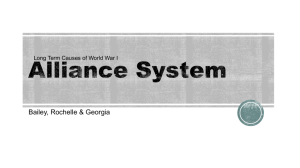section alliances.doc
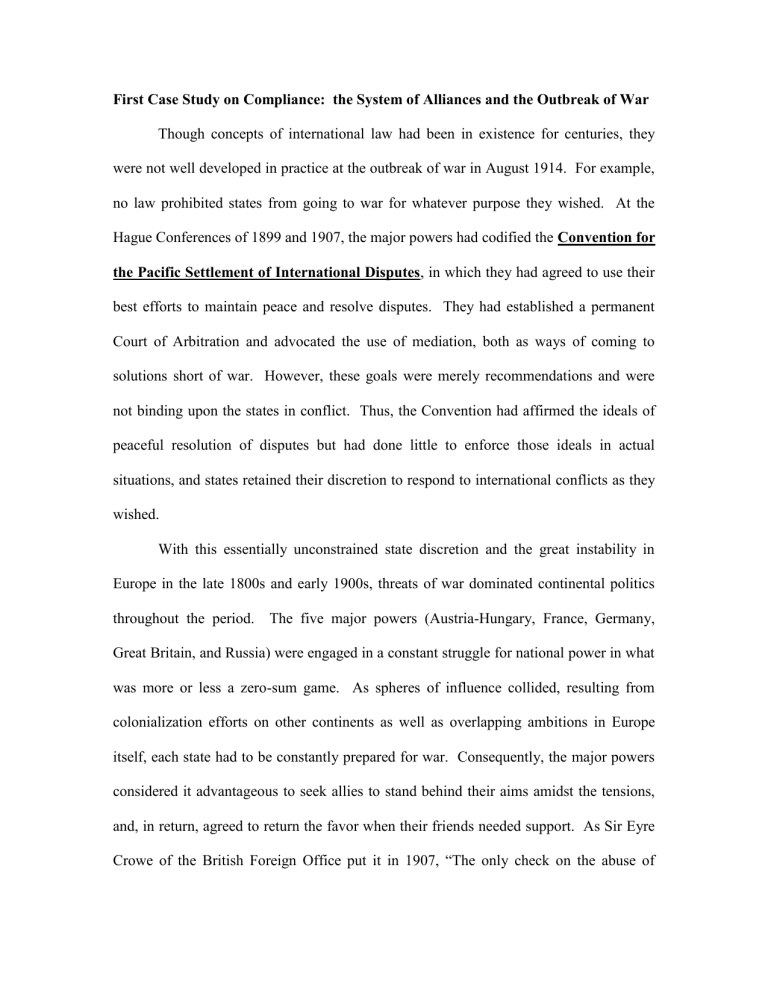
First Case Study on Compliance: the System of Alliances and the Outbreak of War
Though concepts of international law had been in existence for centuries, they were not well developed in practice at the outbreak of war in August 1914. For example, no law prohibited states from going to war for whatever purpose they wished. At the
Hague Conferences of 1899 and 1907, the major powers had codified the Convention for the Pacific Settlement of International Disputes , in which they had agreed to use their best efforts to maintain peace and resolve disputes. They had established a permanent
Court of Arbitration and advocated the use of mediation, both as ways of coming to solutions short of war. However, these goals were merely recommendations and were not binding upon the states in conflict. Thus, the Convention had affirmed the ideals of peaceful resolution of disputes but had done little to enforce those ideals in actual situations, and states retained their discretion to respond to international conflicts as they wished.
With this essentially unconstrained state discretion and the great instability in
Europe in the late 1800s and early 1900s, threats of war dominated continental politics throughout the period. The five major powers (Austria-Hungary, France, Germany,
Great Britain, and Russia) were engaged in a constant struggle for national power in what was more or less a zero-sum game. As spheres of influence collided, resulting from colonialization efforts on other continents as well as overlapping ambitions in Europe itself, each state had to be constantly prepared for war. Consequently, the major powers considered it advantageous to seek allies to stand behind their aims amidst the tensions, and, in return, agreed to return the favor when their friends needed support. As Sir Eyre
Crowe of the British Foreign Office put it in 1907, “The only check on the abuse of
political predominance has always consisted in the opposition of an equally formidable rival, or of a combination of several countries forming leagues of defence,” which would tend to produce a continental equilibrium.
1
Yet, as states chose partners for themselves, even this balance of power was inherently unstable, due to the uneven number of major powers. As Bismarck, the wily German diplomat, had said, “All politics reduces itself to this formula: Try to be
à trois
as long as the world is governed by the unstable equilibrium of five Great Powers.” 2
However, given the propensity for tension in European politics, merely having an understanding of common interests with another state was no guarantee of effective support against other states. Thus, to cement the balance of power, states bound themselves to support and defend each other through treaties of military alliance, the first of which arose in 1882 between Austria-Hungary, Germany and Italy. In their Triple
Alliance treaty , the three powers codified without specific provision the general objectives of mutual peace and friendship, no contrary alliances, exchange of political and economic ideas, mutual diplomatic support (within the limits of national interest), and common counsel to respond to threats to the peace. But as for the military provisions, the treaty only obligated the signatories to intervene on behalf of an ally if that ally was attacked without direct provocation by another great power (i.e., France or
Russia). On the other hand, if an ally found itself forced to make war against another great power due to a threat to its security, the only duty of the other signatories was to observe benevolent neutrality towards that ally. Thus, the conditions binding the signatories to make war on another country were limited to defensive situations.
A decade later, when France and Russia signed the Franco-Russian alliance to counteract the military threat posed by the Triple Alliance, the European powers were effectively divided into two camps, and for the next two decades, all political and military calculations were made on the basis of this division.
3
Yet as in the Triple Alliance treaty, the Franco-Russian alliance was purely defensive, as each state bound itself to attack
Germany or her allies in the event that the other state was itself attacked. Article 2 also obligated each state to mobilize fully and immediately if any of the Triple Alliance states mobilized. The objective was clearly to deter Germany from attacking either state because of the threat of an all-out war coming from both sides. The preamble clearly stated that the signatories had “no other object than to meet the necessities of a defensive war, provoked by an attack of the forces of the Triple Alliance against either of them.”
The treaty also called for military cooperation in planning and in communicating information relative to the enemies’ forces; however, unlike the Triple Alliance, there was no requirement of diplomatic support.
Despite the narrow terms of the treaties forming them, the alliances played an even larger role in European affairs at the end of the 19th century and beginning of the
20th, extending beyond the original purpose of military defense. First, the alliance treaties strengthened the political ties between the signatories, which came to implicate diplomatic support from one’s partners for the objectives one was pursuing. That diplomatic support was a critical element in pre-1914 relations, in that it often emboldened a state to pursue objectives that another state would resent, since the aggressor state could fall back on its partners’ support to dissuade the opposing state from taking hostile steps in response. However, Bismarck, the consummate politician, used his
alliance to do the opposite as well, gaining Austro-Hungarian support for his objectives while at the same time attempting to restrain his ally’s policy in the Balkans to avoid being dragged into war there.
4
Second, public knowledge of the military alliance and the strengthening of diplomatic relations led to increased economic and even emotional ties between allies. For example, in the 1890s, Russia desperately needed foreign capital for investments in industry and transport, and French bankers saw an opportunity to expand their share of the Russian money market.
5 Thanks in part to the known military alliance, the French public responded favorably in buying Russian bonds issued by the French bankers, which further reinforced the positive sentiments between the two allies.
6
And in
Germany and Austria-Hungary, the knowledge of the alliance created an emotional feeling that the two countries were bound together to the same fate,
7
a feeling that would be enormously important at the outbreak of war in 1914. Thus, the military alliances played a much greater role leading up to World War I than the mere terms of the treaties would indicate.
8
The only other treaty of significance at the time was the 1904 Entente Cordiale between Britain and France that had seemed rather inconsequential to the balance of power politics in the early 1900s, yet became the basis for fundamental understandings between the two states that extended far beyond the terms of the original treaty. French and British colonial tensions in North Africa had come to a head, and in a desire to avoid open hostilities, the two sides came to an agreement settling those colonial differences.
9
But by that time, Britain, who had only a few years earlier maintained its isolationist policy and resisted German appeals to join the Triple Alliance, began to see Germany’s attempt at building a large navy as a threat to its traditional naval superiority.
10
Thus, in
the spring of 1905, during an acute French crisis with Germany in which there was talk of war, the British and French governments (as well as their military staffs) consulted on how to respond to the German threat.
11
Thus, within two years of the settlement of colonial issues, Britain and France had begun plans for common military action against
Germany, and this rapprochement between the two states led some British officials to believe they had created a moral obligation to support France in the event war broke out.
12
Thus, in 1914, the relevant treaties imposed clear but narrow legal obligations on the major powers, binding only in defensive situations, outside of which the states remained free to choose the course of action they would pursue. In fact, there had been several instances in which the alliances seemed tenuous,
13
and some observers wondered whether a declaration of war between two belligerent powers would necessarily involve the whole continent. Nonetheless, when the alliances were formally tested, the great powers generally complied with their legal obligations under the treaties, and, more importantly, went far beyond those narrow obligations in supporting their respective alliances, based on the political, economic, and emotional importance the alliances came to embody.
The clearest example of state action exceeding legal obligations came from
Germany. After the June 28th assassination of Franz Ferdinand in Sarajevo, even the
Entente powers thought that Austria-Hungary had the legitimate right to take action against Serbia for its alleged involvement in the hostile act. However, Germany had already decided prior to 1914 that maintenance of the Austro-Hungarian empire was vital to its own interests on the strongly divided continent, because Germany was surrounded
by the Entente allies whose primary goal was to contain German power.
14
Thus, fearing the internal collapse of her only real ally’s empire (Germany had never really considered
Italy a significant ally), Germany pushed Austria-Hungary to take drastic action against
Serbia to crush the growing rebellion, and the Kaiser gave his Austro-Hungarian allies his full support ( carte blanche ) for whatever measures they might deem necessary.
15
But
Wilhelm’s desire to bully his enemies resulted in an unforeseen consequence: it put
Germany in Austria-Hungary’s pocket, pre-committing Germany to support the potential escalation to war, even though Wilhelm may have wanted to prevent that end result near the end of July.
16
Clearly, though, this critical German decision, perhaps the most critical in the events leading up to the war, was not motivated by a sense of legal obligation, but rather by a nationalist desire to maintain and expand German dominance on the continent.
However, Germany’s aggressive actions, including the first declaration of war (against
Russia on August 1st), put it in the position of the instigator, a result the Germans had wanted to avoid both to rally public opinion behind the theory of self-defense, as well as to keep Italy tied to her obligations under the alliance treaty.
17
On the other side, the Russians were committed to maintaining their prestige in the Balkans, and having backed down to German threats the previous year, they decided this time they would stand up to Germany and Austria-Hungary in defense of Serbia.
18
As the timeline illustrates, the same day Austria-Hungary informed Russia of its ultimatum on Serbia, the Russian government began preparations for mobilization against
Austria-Hungary. Then, after an unsuccessful request that Germany restrain the irrational actions of her ally, Russia ordered mobilization as soon as it received word of Austria-
Hungary’s declaration of war against Serbia. But this action was taken for political, not
military reasons.
19
Russia displayed her willingness to defend Serbia, though under no obligation to do so, primarily hoping to pressure Austria-Hungary to back down and seek a negotiated settlement of her dispute with Serbia.
20
Nor was Russian mobilization required by Article 2 of the military alliance with France , which only mandated mobilization as soon as a Triple Alliance state mobilized against either France or Russia.
Thus, Russia took action entirely within its discretion, unconstrained by the terms of any alliance treaty.
French compliance with its obligations under the military alliance with Russia was never effectively tested, since as soon as Germany had declared war on Russia, she was also threatening France and preparing for the western sweep called for by the
Schlieffen Plan. Thus, the French were forced to prepare for war to defend themselves and never had to face the decision of whether to mobilize against Germany if Germany had only attacked Russia. Nonetheless, when Austria-Hungary mobilized on July 31st,
France ordered mobilization for the following day, complying with Article 2 of the
Franco-Russian military alliance , which required immediate and full mobilization as soon as one of the Triple Alliance states mobilized. Moreover, France took an extraordinary step to make it clear that she was the victim of German aggression, pulling her troops back ten kilometers from the entire German border, but this measure was designed primarily to convince Great Britain to enter the war against Germany.
21
The Italian alliance with Germany and Austria-Hungary had always been a selfinterested attempt to give the recently united Italian kingdom the status and prestige of a great power.
22 However, the alliance had been somewhat troublesome from the beginning, given the conflicting Italian and Austro-Hungarian territorial claims and the
popular sentiment in Italy against its neighboring empire.
23
In fact, Germany and
Austria-Hungary had never been confident of Italian support of the alliance (the Austrian
Chief of Staff calling the alliance “a burden and a fetter which [Italy] would cast off at the first opportunity”), 24
and their doubts were substantiated on August 3rd, when Italy declared her neutrality in the war. To defend its action, Italy stood on the letter of the
Triple Alliance treaty , which required intervention on behalf of the allies only if they were attacked without provocation.
25 The German and Austro-Hungarian ultimata technically made them the aggressors and absolved Italy from any obligation to join them.
26
However, Article 1 of the treaty obligated Italy to enter into “no alliance or engagement directed against” its allies, and Article 4 bound the signatories to observe benevolent neutrality towards an ally at war with another great power that did not fit the terms of the defensive alliance. Italy breached their obligations under these articles in
April of 1915, when she joined the Entente allies after they had promised the territorial spoils from Austria she had been seeking.
27
Thus, Italy steadfastly followed her national interest, declining to support her allies beyond the terms of the Triple Alliance treaty in
1914 and even breaching that treaty in 1915.
Romania had also sided with the Triple Alliance camp after its treaty with
Austria-Hungary first signed in July of 1892 and then renewed in the treaty of February
5th, 1913 . But despite the pleadings of its pro-German king (King Carol I), the
Romanian government followed Italy’s lead in maintaining neutrality in August 1914, using the defensive nature of its alliance treaty as grounds to stay out of the conflict.
28
Romanian nationalists had begun to clash with Austria-Hungary since the second Balkan
War and were now dreaming of incorporating areas occupied by Romanian minorities
within the Austro-Hungarian empire into a Greater Romania.
29
Then when the Entente allies promised those territories to Romania at the conclusion of the war, Romania joined forces with the Entente countries and declared war on Austria-Hungary in August 1916.
30
Thus, remarkably similar to Italy, Romania asserted a legal defense that allowed it to get out of an alliance treaty it no longer felt to be in its best interests, and instead, the country ended up fighting against its former allies.
31
And just as Italy had done, Romania breached its obligation (in Article I of its treaty) not to enter into any alliance directed against its allies.
As for Britain, the rapprochement embodied in the Entente with France had by
April of 1912 grown into an informal naval agreement, by which the French fleet would concentrate in the Mediterranean and the British would defend the English Channel and
France’s northern coastline.
32 This naval agreement resulted from Britain’s increasing awareness of the threat Germany posed both to her naval supremacy as well as to her interests generally in a stable continental balance of power. In the end, though, Great
Britain (according to its official statements) did not enter the war against the Triple
Alliance powers primarily to uphold their naval agreement with France, nor to defend its own interests on the continent, but rather on the moral grounds that it had to defend neutral Belgium from the German invasion. Discussion of the British debate over intervention follows in the second section of this paper. The important point, though, for purposes of this section is that Britain was under no treaty obligation to enter the war; rather, it too made the discretionary choice to fight.
Europe had been ripe for war for many years, and several events prior to August
1914 had almost pushed the world past the breaking point. What made the events of
1914 different is not the focus of this paper. The key point is that the system of alliances and the comprehensive meaning those alliances took on over time, in all facets of society, provided a volatile structure for international politics.
33
The two-camp structure of
European relations conditioned expectations about the battle lines to be drawn between friends and enemies in the increasingly likely outbreak of war.
34 Nonetheless, if the great powers had merely complied with their legal obligations under the alliance treaties, the great war would have never occurred, because of the defensive nature of those obligations. In a world divided by defensive alliances, neither side could be certain of the support of its allies on offensive measures. However, states chose to exceed their obligations in support of their allies to achieve the greater objectives that the alliances had been formed to promote and to show that their alliances were strong and unwavering.
An interesting and undeniable footnote to the alliance system is how much each side tried to avoid appearing to be the aggressor in the outbreak of the war. It is not implausible to think that some of this posturing may have resulted from an attempt to arrange the circumstances in such a way as to bind one’s allies to the defensive terms of intervention under the alliance treaties. Germany was cognizant of the reality that Italy would likely try to back out of its obligations under the Triple Alliance anyway, and the
Germans knew they did not need to give the Italians just cause to do that. Also, as mentioned briefly in the other issues page, some German officials wanted to avoid formal declarations of war in order not to appear as the aggressor. However, some of these attempts to induce one’s enemies to take the first steps of aggression clearly
stemmed from the political gaming with regard to Britain. France pulled her troops ten kilometers off the eastern border with Germany, to demonstrate that it was the Germans who were out to dominate the continent, and to convince Great Britain that it could not simply stand by and allow them to succeed. On the other hand, Germany wanted to cast
Russia as the aggressor,
35
hoping to convince the British not to intervene on the side of
Russia, a state with which Britain had consistently had a strained relationship. Finally, characterizing the enemy as the aggressor satisfied the need to justify the war to one’s own citizens and to unite them against that enemy in this patriotic war.
1 Joll, Origins of the First World War (2d ed.), ch. 3, page 5.
2 Joll at id.
3 Joll at 7.
4 Joll at p. 7.
5 Joll at 9.
6 Id.
7 Joll at 7.
8 Joll at 7.
9 Joll at 13.
10 Joll at 13.
11 Joll at 15-16.
12 Joll at 16.
13 See, for example, the Russian ambitions at Constantinople in 1908 and the unsuccessful German demands on France in 1912, which left both Russia and Germany wondering whether they could count on the support of their allies if they were attacked without their allies’ interests being affected. Joll at 20-21.
See also Tuchman, The Guns of August, early Ch. 7, regarding Russia’s fear that the French Parliament would fail to ratify the terms of the military alliance when the time came.
14 Joll at 18.
15 Stokesbury at 26.
16 Stokesbury at 26-27.
17 Tuchman, end of Ch. 6.
18 Joll at 31.
19 Mark Trachtenberg, “The Meaning of Mobilization in 1914,” in …, at 205.
20 Trachtenberg at 205, citing Bernadotte Schmitt, Coming of the War, Vol. 2, p. 94.
21 Tuchman, beginning of Ch. 7.
22 Joll, at 24.
23 Joll, at 24.
24 Joll, at 25.
25 Stokesbury, at 105.
26 Stokesbury at 105. Germany had foreseen the such reliance on the defensive nature of the treaty, realizing that if it pushed Austria-Hungary to reject Serbian concessions, it would lose Italy as an ally. But the knowledge did not change the course of German action. Tuchman, end of Ch. 6.
27 Stokesbury at 106.
28 The World in the Crucible, p. 13.
29 The World in the Crucible, p. 12-13.
30 Stokesbury, A Short History of World War I, 1981, p. 165.
31 See Joll at 30.
32 Joll at 22.
33 Jack Levy, “Preferences, Constraints, and Choices in July 1914,” in …, at 259.
34 Joll at 31.
35 Trachtenberg at 217.
